#strong female characters
Text
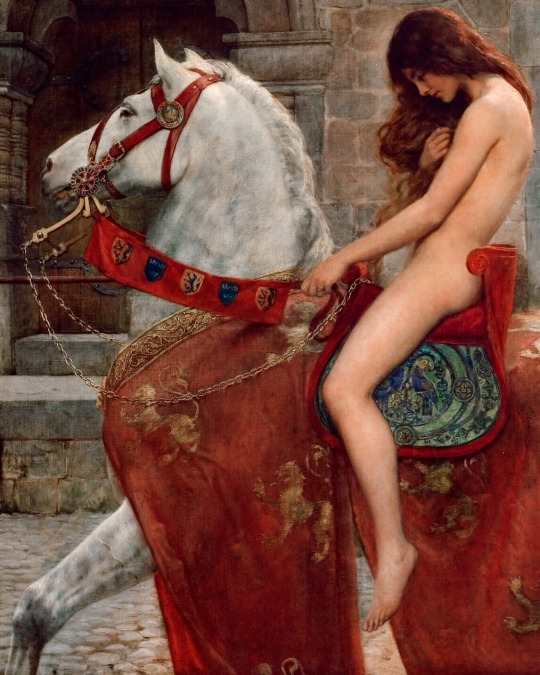
Lady Godiva (1898)
— by John Collier
#painting#art#art history#oil on canvas#oil painting#classical art#classic academia#red academia#dark academia#feral academia#museumcore#artblr#strong female characters#strong female character#chaotic academia#museum aesthetic#museum date#academia aesthetic#horse#dark feminine energy#divine feminine#dark feminine aesthetic#art community#artist#art gallery#museum#artists
729 notes
·
View notes
Text
It annoys me how so much of modern discourse around female characters is, to be frank, misogyny repackaged as being progressive.
If a woman's strengths and interests are associated with being feminine, such as cooking or enjoying nice clothes or being kind and compassionate, the entire fandom jumps on her as stereotypical or weak. It's seen as cool to bash on "women's work", never mind that your average misogynist has been doing it for decades, hell, centuries, and the jobs that are mocked as women's work are actually pretty essential to humans surviving and thriving.
And then, of course, if a woman shows the slightest hint of nonconformity, the entire fandom jumps on her because "oh!! she's trying to be not like other girls!! she wants male attention so bad!!" It doesn't matter how she is to the other girls in her life, if she wears combat boots and listens to punk instead of Taylor Swift, she clearly hates every other woman ever according to certain parts of fandom. It couldn't be that she's neurodivergent or LGBT or hell, even just a tomboy, she has to hate every other girl on the planet. /sarcasm
AND JUST TO CLARIFY. These tropes can genuinely be negatively done. The traditionally feminine girl can be a weak character and the tomboy girl can be an ass. But when you're calling a girl a "pick me" just because she doesn't live up to your idea of what a woman should look like or what you think feminism is... congratulations. You've simply repackaged sexism and called it woke. And lots of girls who see this crap online are going to suffer for it but hey, it was never actually about them, so who cares, right? /sarcasm
Anyway, to all the girls reading this post, you go ahead and be who you want. Be a princess or a president or a pop singer or a punk rocker or hell, all of the above. You're not a "pick me" you're not a "handmaiden" you're not trying too hard to be "not like other girls". You are fine. Don't let pseudo-woke nonsense get to you. It's just white noise.
#and to all of you guys who are maybe younger just know. youll learn to drown it out#you might still roll your eyes and if you have anxiety like me you might still have bad days but. it gets better#you are worth so much more than worrying about people who refuse to give you good faith and their stupid judgements of you#fandom critique#feminism#female characters#strong female characters#pick me girl#pick me#handmaiden#nlog#not like other girls#all queued up with nowhere to go
317 notes
·
View notes
Text

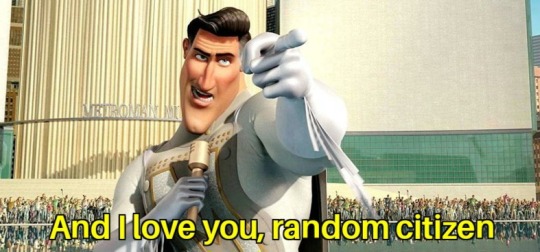
#dc#dc comics#comics#comic books#birds of prey 2023#birds of prey#big barda#kelly thompson#character dialogue#memes#megamind#funny memes#funny#comic pages#comic panels#comic characters#megamind meme#humor#superheros#woman character#strong female characters
100 notes
·
View notes
Text
How many times do we have to say:
Create characters with strength of virtue, not strength of skills.
I just finished A Tale of Two Cities with the character Lucie Manette, who "does" nothing but love the people around her and extend compassion toward everyone within her sphere of influence. She makes no "choices" that contemporary audiences would award the stupid badge of "giving her agency" to.
She doesn't make a speech that saves Charles Darnay's life. She doesn't lead the victims of the French Revolution into a counter-revolt. She doesn't fight off the soldiers that come to take her husband, or beat up Madame Defarge when she threatens her child, or even come up with the escape plan to flee Paris.
She makes none of those kinds of choices. (You know who does? Madame Defarge. But the compare-contrast between those two can wait till another day.)
But she makes these kinds of choices:
She'll give her honest testimony in a trial for a potential traitor to the crown, and demonstrate her compassion and grief for a near-stranger, wearing that vulnerability on her sleeve in front of a huge court of people clamoring for blood.
She'll be compassionate toward Sydney Carton, even though he's rude, careless, and brings a bad attitude into her happy home.
She'll spend the energy of her life making that home happy.
She'll stand for two hours in any weather on the bloody streets of the French Revolution so her husband might have a chance of glimpsing her and getting some comfort from the prison window.
She'll trust the older men in her life when they ask her to.
She'll allow an old woman to care for her and go everywhere she goes, and treat her like a child, as long as it makes the old woman in question happy.
And what, WHAT is the consequence of these kinds of decisions, choices, that some ignorant people call "passive?"
That old woman is allowed to love Lucie Manette so much that she defeats the villainess in the climax of the story, holding Madame Defarge back from getting revenge with sheer strength that comes directly from that love.
Her father is allowed to draw strength from the fact that Lucie believes she can depend on him--because she chooses to let her father take the lead and do the work of saving her husband, Dr. Manette is fully "recalled to life;" he doesn't have to identify as a traumatized, mentally unstable victim anymore, because Lucie is treating him like he can be the hero.
Her husband does see her in the street, and does draw strength from that--just that--instead of losing his mind the way her father, starved for a glimpse of his loved ones, did during his own imprisonment.
Lucie's home is so full of the love and kindness that she fills it with that not only does her father return to remembering who he is after his long imprisonment--but Mr. Lorry, a bachelor with no family, can feel at home with a full life, there. Miss Pross, whose family abandoned and bankrupt her, has a home with a full life, there. Charles Darnay, whose life of riches and pleasure as a Marquis was empty, has a home with a full life, there. In Lucie's home, because she spends her life making it the kind of home others can find rest in.
Sydney Carton, a man whose whole life has been characterized by a LACK of "care" for himself or anyone else, suddenly cares about Lucie. When he thought it was impossible to. And he doesn't care about her because she's pretty. Her beauty was just a source of bitterness for him--one more pleasure he could've had but can't. Until he "saw her with her father," and saw her strength of virtue, of pity, of compassion, of self-sacrificial love--then he felt that she "kindled me, a heap of ashes, into fire." He started caring about life again, where it was associated with her, because she brought to life every good thing. Just by being a woman of good virtue. And we know what that inspiration led him to.
Without Lucie's strength of virtue, and the decisions that naturally came from that, none of the "active" choices other characters made would have happened. Sydney would not have been redeemed. Darnay would not have been saved. Her father never would've been recalled to life. Miss Pross and Mr. Lorry would've had no light or love in their lives. Even Jerry would've had no occasion to learn from his mistakes and resolve to stop abusing his family.
A character like Dickens' Golden Thread, who does what a woman should do, inspires the choices other characters make. That makes her more powerful, in her own way, than the heroes and any decisions they make. Because she's the cause. She's the inspiration. She's the representation of everything good, right, precious, worth fighting for.
Lucie Manette's not the only character like this. Cinderella. The original Disney Jasmine. The original Disney Ariel. Lady Galadriel. Jane Eyre. Amy March.
"Behind every great man is a great woman," indeed! Absolutely! Bravo!
Hang on! Hang on to those kinds of characters. Those a real "strong female" characters. The muses, the inspirations, the reminders of The Greater Good. The people who make fighting the dragons worth it at all. Who cares about fighting the dragon? That's not so great, without her.
Don't forget those kinds of characters! Reading Dickens just makes me desperate for our generation to keep up the reminder: make characters that the next ten generations can learn from: strength of virtue is much more important than silly little strength of skill.
#Dickens#Charles dickens#writing#storytelling#behind every great man is a great woman#strong female characters#strong woman#Lucie Manette#a tale of two cities#classics#writing advice#feminism#feminism is poison#Christianity#Christian fiction#tropes#Sydney carton
66 notes
·
View notes
Text
My thoughts about The Private Life of Sherlock Holmes:
Let's start by summarising the movie -
No crime-solving happens in the first 34 minutes. The first act is all about Holmes and Watson's dynamic, exploration of the nature of their relationship with each other, etc. If you're the type of person who only watches/reads Sherlock Holmes for the cases, you'd believe this portion is skippable. Only the blink-and-miss detail about the "Midgets' case" is important as far as Holmes' detective work is concerned.
However, if you think exploring Holmes and Watson's interpersonal relationship and their casework are both equally important, like I do, the first act is GOLD. Most of the Tumblr gifs about this movie are from the first 30-35 mins lol.
1.) Holmes enters and they bicker like an old, married couple.
H: Oh, come now, Watson, you must admit that you have a tendency to overromanticize. You have taken my simple exercises in logic and embellished them, embroidered them, exaggerated them ---
W: I deny the accusation.
H: You have described me as six-footfour, whereas I am barely six-footone.
W: A bit of poetic license.
Not only is this whole scene just delightful in general but the theory about Watson being an unreliable narrator in ACD canon is actually being supported throughout the movie, starting right here.
--
W:It's those little touches that make you colorful...
H: Lurid is more like it. You have painted me as a hopeless dope addict - just because I occasionally take a five per cent solution of cocaine.
W: A seven per cent solution.
H: Five per cent. Don't you think I'm aware you've been diluting it behind my back?
This exchange was lovely. Way to slip in their closeness through a few words.
2.) Watson doesn't think it's odd to barge right in when Holmes is completely naked and taking a bath?
Also, why the hell does Holmes bathe with his bedroom door wide open?
And what's that thing he's taking a bath in called? Does anyone know about this stuff? Was this thing common in that timeline? It doesn't seem to fit a grown man like Holmes.
I have so many questions and I'm speechless at the same time. I'll just drop this here:
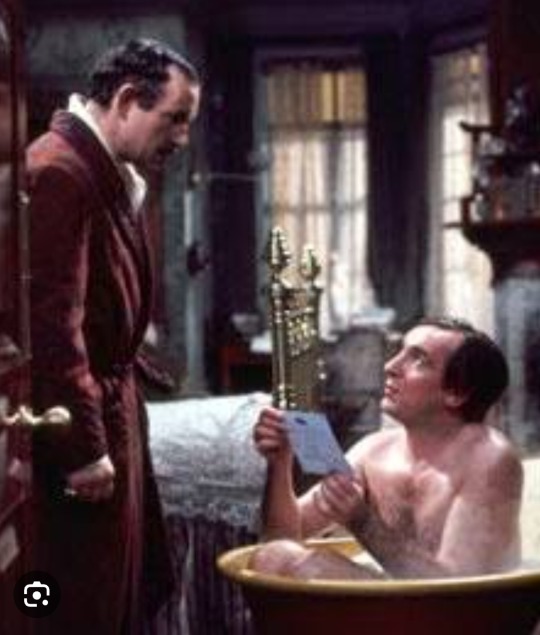
3.) Then Watson persuades Holmes to go to The Swan Lake ballet.
Watson enjoys that ballet, a little too much at that, mostly because he's staring at all the women on stage. (We'll get back to this later.)
Holmes on the other hand has dozed off. All he can admire about the most beautiful dancer, Petrova, is her strong arches. Which is... 🏳🌈
Then that whole scene about Nicholai and Petrova and Holmes in the dressing room. XD
Petrova offers a Stradivarius violin to Holmes in exchange for sleeping with her for a week, so that her child would be beautiful like her and brilliant like Holmes.
Holmes gets out of the situation by lying to both of them; saying he's in a relationship with Watson.
Honestly, that whole bit. Just look at the lines:
N: She has been dancing since she was three years old, and after all, she is now thirty-eight.
H: (gallantly) I must say she doesn't look thirty-eight.
N: That is because she is forty-six.
And:
Nicholai: (about Tolstoy) Too old --- Then we considered the philosopher, Nietzsche --
H: Absolutely first-rate mind ---
N: Too German --
Etc. They're all so funny. This whole scene is something else.
In fairness to Holmes, he did try to get himself out of the situation by lying about having hemophilia in his family, or saying that he's unromantic because he's English, etc but Petrova was having none of it.
Watson coming into the room all of a sudden gives so much clarity and calmness to Holmes. He just knows what to say to help himself because of Watson.
This unforgettable exchange:
N: You mean, you and Dr. Watson - He is your glass of tea?
H: If you want to be picturesque about it.
On a side note, I absolutely loved Nicholai's face journey throughout both scenes - in the dressing room, stuck in the middle of Holmes and Petrova's awkwardness, and later on when he asks about the alleged Holmes-Watson romance to Watson after having spread the rumour in the whole room.
I just loved his reactions a lot.
According to this movie-
Caprice of Mother Nature = Gay.
Half-and-half = Bisexual.
Watson comes to know about the rumour, after having had the time of his life with both men and women in the ballroom. Watson is pissed off, he goes home and confronts about the whole thing to Holmes.
They have a row at Baker Street, in which Watson is being extremely heteronormative again. Thinking too much about his reputation without stopping to question his own feelings and his weird fixation on Holmes' love life.
There's that famous line again:
W: Holmes, let me ask you a question. I hope I'm not being presumptuous -but there have been women in your life?
H: The answer is yes -- you're being presumptuous. Good night.
Awesome.
This marks the end of Act I.
The existence of these 33 minutes of the movie is proof that the writing team in this adaptation knows that exploring Holmes and Watson's characters and what they mean to each other is as important as Holmes' casework. Billy Wilder takes this seriously, even though there are some jokes here and there about it.
The whole of Act I is filled with raising questions about Holmes and Watson's preferences, etc. Does Holmes feel love or is he just a machine? Does Holmes feel love for Watson? Does Watson know about Holmes' feelings for him? Does Watson feel the same way about Holmes?
In my opinion, all the answers to the personal questions about Holmes are as clear as a day. What's really questionable is whether Watson knows and/or feels the same way about Holmes or not. Different viewers might draw different conclusions/inferences after watching this movie.
After this, the movie takes a turn because "Gabrielle" enters the picture, and the actual crime-solving begins from here. The tone becomes a bit more serious in this act.
A young woman, completely wet and in shock enters 221 B. Watson has to pay for her fare to the cabbie before he and Holmes take her upstairs to take care of her.
She can't remember anything at first, then from her wedding ring, Holmes gets to know her name: Gabrielle Valladon. Her husband's name is Emile Valladon.
She appears to have temporary amnesia because of getting hit on the forehead and almost drowning in the Thames.
She reveals info about herself that she's from Belgium, her husband was here in London for a job, they used to write to each other, and after some time, the letters from her husband stopped coming. She'd gone to the London police first after coming to this city. She says the police had advised her to consult Sherlock Holmes.
Now, this should make the viewer skeptical of her. Scotland Yard does consult Sherlock Holmes when they need him, but they aren't going to let him have the whole case if there's a situation like this.
Besides, that woman ending up at Baker Street specifically seems to be planned, anyway. Also, there's always this man who keeps waiting for her or someone else's signals on the outside.
I know what we see on screen comes from Watson's drafts on loose pages, but this movie's narration seems to be Third Person Omniscient POV to me. Where the viewer is privy to more information as compared to the characters.
The three of them keep looking for her husband's whereabouts, and she pretends to be helpless, needy, and fragile (to stroke the ego of the men around her, I believe. I mean that could be one of the reasons...) with temporary amnesia throughout most of the movie. Holmes and Watson don't suspect a thing about her as they keep working for her and she keeps sending cryptic messages to the "Trappists" (German government) with her parasol.
The thing I love about this act:
Ilse von Hofmannsthal aka Gabrielle Valladon is actually a competent character who happens to be a woman. We can see something shady is going on with her even though we don't know her real name, but one of the most brilliant people on the planet doesn't suspect anything. He thinks she's just a woman looking for her husband's whereabouts. He thinks her back story is real.
He keeps on thinking that until Mycroft basically tells him in the third act which is why we're able to see for ourselves that Ilse was genuinely able to outsmart Holmes. We don't have to be told by the narrative voice about Ilse's strengths (*cough* unlike BBC Sherlock and a lot of female characters written by Steven Moffat *cough*).
I, for one, felt respectful of Ilse or "Gabrielle" for real. It was quite refreshing to me after having watched some modern Holmes adaptations.
Holmes, Watson, and "Gabrielle" go looking for the cause of Emile Valladon's death after they've found his coffin in the graveyard, in the guise of having a picnic. Holmes and "Gabrielle" pretend to be a married couple - Mrs and Mr Ashdown, and Watson is their valet. The scenes after this point are delightful mainly because of Watson's reactions (which could be read as his jealousy over Holmes, too).
Also, me when Holmes calls Watson 'John' in an archaic Holmes adaptation:

Because of his sort of stupidity, Holmes takes Ilse, a German spy, right in front of the submersible (which he thinks is a mechanical 'monster' that lives underwater) in a boat, along with Watson.
Ilse was trying to grab as much information as she could about that secret project because she was working for her country. Who knew someone would show her the live version of that model so readily (albeit unknowingly)? :P
The three of them are obviously unable to find anything about Emile Valladon, so they go back to the inn room they're staying in.
That's when one of Mycroft's men comes to pick Holmes up and take him to his elder brother. Here's when the third act begins, I think.
Mycroft had warned Sherlock not to pursue "Gabrielle's" case any further during the second act. But Sherlock didn't listen, because a.) he's an empathetic man, and b.) Mycroft can't just order him to do or drop something just because. Sherlock is not a child anymore.
I know Mycroft was only trying to protect Sherlock, and that he couldn't have told him the real reason to stop him at that time, but still.
Either way, months of planning and testing the submersible have gone to waste because Holmes did not suspect at any point that his client, "Gabrielle Valladon" might have just been lying to him since the start. Can't blame Holmes for that. Ilse was meticulous.
Mycroft shows the model to the queen and she strongly disapproves of the model and curses it a lot. Personally, this seemed to be a shitty decision on her part, and I felt so frustrated and annoyed at her in that scene. She didn't even care to hear about its features. She just rejected it on the spot! :(
Mycroft decides to 'give the submarine' to the German government. It's implied that the Trappists were drowned along with the submarine itself in the deep waters. (That's what I gathered from that scene - correct me if my interpretation was wrong).
In conclusion, while Ilse is genuinely able to outsmart Holmes (unlike some writers forcing us to believe it in their adaptation because they told us so), the German government isn't able to go anywhere with the info they've gathered through Ilse because of Mycroft's last move. Moreover, the English government would have sent her to jail, if Sherlock hadn't suggested Mycroft send her back to her own country.
So, in the end, it's a lose-lose situation for all of them.
1.) Sherlock Holmes didn't know that Ilse was faking her name and her whole identity for a long time, so he unknowingly helped a German spy, thinking he was just helping an ordinary client. Ilse almost had him and the viewers could see for themselves that she'd outsmarted him.
2.) Even after Ilse von Hofmannsthal has got what she wanted for her government, as a spy, they aren't able to make use of that info because of Mycroft. And she has to get out of England anyway.
3.) Mycroft Holmes also fails, to some extent, because ages of effort to plan the submersible, hide the plans, and test the model in secret - all of it has gone to waste. The queen doesn't even want to hear him out in the end.
But even if it was a lose-lose situation, the battle was damn intriguing because of the high intellect on both sides - Holmes brothers and Ilse.
Months later, Holmes receives a letter from Mycroft about Ilse's arrest and execution by the Japanese government. Reading that, he's so moved that he can't even finish his breakfast. He gets up and asks Watson for his cocaine supply. Watson tells him, and then Holmes grabs the bag and goes to his room. Holmes shuts himself in, Watson gets up from the breakfast table too, sits beside the fireplace, and begins to write something on a piece of paper. Probably about the case, but for nobody to see.
End of Act III and the movie.
--
I loved the background score of this movie. It's quite touching and refreshing to listen to.
A lot of dialogue exchanges in the movie are so deep if you stop to think about them. It's unbelievable how much writers can convey through a few words. Some of them are quite funny too - particularly from Act I. There's a thin line between being funny and mocking, and TPLOSH didn't cross that. It was nice.
I love this portrayal of Sherlock Holmes. It's clear how deeply they've understood him from the original canon. Pretends to be dismissive and closed off but actually cares about everyone way too much.
I also liked Mycroft in this movie, even if he didn't have much screen time.
About Ilse von Hofmannsthal - I loved her. Seriously, this is how you write female characters, modern writers! People say ASIB is a direct adaptation of TPLOSH, which is true, but I'd prefer TPLOSH over that episode any day, and one of the reasons is the way the female lead has been written in the former. Not exactly a fan of how Moffat wrote her in his adaptation. He did her dirty, I'd say.
Characters like Ilse make me think that the writing team of this movie knew what feminism is. I can't say the same for the modern Holmes adaptation that has been heavily inspired by TPLOSH.
I loved the plot of this movie too. The case in itself was also pretty interesting and kept me hooked throughout. Even if it wasn't exactly resolved finally, and the ending was melancholic.
I wasn't expecting the movie to be this good. Which is why it took me so long to sit down and watch it.
I only have one complaint about this movie - Watson's characterisation.
I mean, Watson wasn't half as bad as I'd expected (I thought he was going to be horrible, based on the snippets of the movie I'd seen before), but still. I like how he doesn't fall into the bumbling idiot stereotype. As far as the casework is concerned, Watson is also quite competent and observant in his own right. He can handle the medical work too.
I've got problems with his heteronormativity, and the fact that when it comes to deducing what lies in Holmes' heart, he's dumb as bricks. It's annoying. Like, it's one thing if he doesn't feel the same way about Holmes, but he doesn't have to be so weird and homophobic about it. Also, I think Holmes should've told him about the truth related to Ilse and the 'mechanical monster'. I've had enough of 'keeping Watson in the dark for his own good', damn it! He should be more in the knowledge.
Watson's character was the only element in the movie that didn't receive justice from the writer. As a Watson-centric fan, I need this to stop happening in future Holmes adaptations. People should see more from his POV too, and stop to actually see where he's coming from, and properly understand his character in the next show/movie/whatever they make.
What I gathered from the movie about the characters and their interpersonal relationships-
Holmes is in love with Watson but doesn't admit it... for valid reasons this time. (side eyes at Watson's homophobia).
Watson is deeply attached to Holmes but sees him as a close friend. I wish he felt the same way about Holmes in this movie, but alas! Though if he doesn't feel that way about Holmes, why the hell does he seem so jealous of Ilse in Acts II and III? This is beyond me.
I think what they've tried to show is that Watson is too close-minded to confront his possibly repressed feelings for Holmes, deep within his heart? Maybe. It could very well be my wishful thinking lol.
But as far as Holmes' feelings for Watson are concerned, it's not even wishful thinking. It's just... right there. I wish the subtext about Holmes' pining were spelled out. I know why it couldn't (the Doyle estate was being a pain in the ass at that time), but still. It's quite clear what they wanted to write as far as Holmes' emotional side was concerned, but they dropped it from the scripts after Act I and decided to focus on the case instead.
Holmes is dismissive of 'Gabrielle' at first, but he becomes sympathetic for her after some time. He reaches out to help her with her situation, and as the plot moves forward, he grows affectionate for Gabrielle/Ilse, which is why he doesn't hold a grudge against her when he realises he's been outsmarted by this woman (even though his ego was mildly hurt for a while).
The way they maintained a balance between the plot and the characters is commendable. I love seeing well-written women in fiction and this movie showed me that.
I was surprised to see how good this movie turned out to be, as compared to my preconceived opinions. The Private Life of Sherlock Holmes has officially become my comfort movie now. Miles ahead of BBC Sherlock, in my opinion.
Thanks to my discussions with @jamielovesjam in a previous post about this movie lol. I wouldn't have wanted to watch the movie if not for the long talk I had with them. Also tagging @gaypiningshit and @helloliriels for further discussion.
End of my unnecessarily long rambling.
#sherlock holmes#john watson#holmes/watson#meta#the private life of sherlock holmes#TPLOSH#sherlock meta#my long ass review of a newfound favourite movie#movie review#gregorovitch being passive-aggressive#Ilse von Hofmannsthal#new blorbo acquired#strong female characters#a lovely movie overall#long post
99 notes
·
View notes
Text
I'm surprised by the lack of popularity of Imodna. Don't get me wrong, the ship is popular, but it could be more.
These days, I was thinking about wlw/mlm representations, and it's just crazy how a majority of people seem more enthusiastic about mlm ships. I like mlm, but why would people prefer it? I don't understand the "love is love, but mlm > wlw" logic. I'm saying that because I'm pretty sure that if imodna was a mlm ship it would be waaaaaay more popular. When you search on AO3 (Critical Role) there are around 8353 mlm fictions and only 5434 wlw. Why?
It's like with powerful male characters vs powerful female characters. I mean if Philippa was Philippe, a powerful and morally grey gay sorcerer, I'm pretty sure he could be a top 5 fan favorite characters of the Witcher fandom. Same for sooooo many fictional characters. You only have to switch the gender to change the fandom perception of a character/ship.
Yeah I'm really random tonight but this thought was stuck in my brain and I had to write it down somewhere.
No offence to mlm or male characters btw.
Why am I thinking about that at midnight.
#imodna#critical role#random thoughts#the witcher#philippa eilhart#laudna#imogen temult#wlw#mlm#why#ao3#why why#bl vs gl is such a useless fight#everyone is gay in the end#justice for#strong female characters#lesbians#and sapphic#bi women pan women aroace women: women#straight women too but it's not the subject#why am I fighting against me in my own tags#why does the brain brains this way#stop braining#oh here I go#random again#sigh
119 notes
·
View notes
Text


its strange but today i found out that for me a movie like bulbul has become a comfort film. in some strange way, it is so soothing & consoling. perhaps, it’s the familiarity to bulbul’s life that most women resonate with.
shoved into the unknown since a tender age, she was still able to nurture her innocence. but the dreadful clouds of peril always loomed nearby, whispering that she must proceed carefully. somehow she was aware that a storm would occur, drenching her in a deep shade of red, coursing through her with heartbreak, rage & violence.
despite the gut wrenching visuals and story, it is but a female fantasy. one may ask how something so grotesque could be called such a thing. yes, it’s a saga of a woman as her nativity dies mercilessly. but she’s also offered the gift of vengeance in which she succeeds.
it is rare to see such a raw and authentic portrayal of female rage and the ability to express it so freely. in her placid smile and her hungry eyes she harbours contempt and wrath but she swallows it relentlessly; for she knows that such secrets must be kept in the badi haveli.
#desi tumblr#desiblr#desi tag#desi aesthetic#poetry#poets corner#indian dark academia#desi culture#desi poetry#desi stuff#desi dark academia#indian writers#indian poetry#indian women#desi women#light acadamia aesthetic#desi light academia#indian light academia#dark academic aesthetic#love#bulbul#goth aesthetic#indian cinema#desi post#desi movies#being desi#women#tripti dimri#strong female characters#female rage
34 notes
·
View notes
Text
jo march blossomed into a world where the end all for women is romantic love. a world where romance is prized and valued over friendships, sometimes even familial bonds, leaving those who do not dwell on such subjects to feel isolated. loneliness for jo is not the lack of a romantic partner. it is the cold tones of an empty attic that is haunted by the memory of one filled with the golden light of laughter from best friends and sisters. Not much has changed from past to now with the idea that love is all a woman is fit for.
it's seen as taboo for a strong coded female character to admit to wanting to be loved. years of cultural messaging made many women associate independence or female autonomy with being stoic, being emotionless, the weapon-wielding, frequently assumed heterosexual heroine should be alone or else she is risking exhibiting subordination or dependence. as if her coexistence with a man automatically diminishes her to a secondary character. the emotional burden of romance, in most mainstream media, is often carried by the female character. even in the arc of the male hero, his love interest is written solely to fulfill a function as a stepping stone to self-actualization or a precursor is his "man pain."
jo march is terrified of change. she finds no comfort in the future. jo would prefer to stay young and play in the attic till the children’s last breaths because what was can feel better than what is. however, change is forever linked to the wheel of time. suddenly, all this change came in rapidly in her life, as it does for all people when nearing the endings of childhood. everything is happening so quickly, and it can not be undone.
jo has a desperate desire- need to be alone, however not to be lonely. she is a woman fueled by passion, a passion that has consumed her entire being into a state of delusion. delusion in the sense that she lives in hopes that her and loved ones will stay youthful to play with her. jo's passion is bound by the inevitable, time. the little world that she had created with her sisters had shattered from the "curse" of aging. therefore, she actively tries to keep that same spark in her writing. her fantasy is better than the burden of reality. jo march is grieving the loss of innocence and childhood. as everyone else is going along with their individual lives, jo has either consciously or subconsciously chosen to never emotionally grow up.
(all based of the 2019 version)
#jo march#little women#little woman 2019#little woman movie#amy march#amy x laurie#laurie laurence#beth march#strong women#women#aromantic#strong female#strong female characters#character analysis
47 notes
·
View notes
Photo

Saleen Jarvik
90 notes
·
View notes
Text


Katara was my favorite character growing up. Although I don’t consider her my favorite character anymore I actually appreciate a lot more than I did when I was younger. She’s honestly one of the best written female characters I’ve ever seen. I love all of the atla characters.
As a kid I just thought she was pretty and cool(which she is)lol same with Yue too
Ps: just a reminder it’s ok not to like a character but that doesn’t make them a bad character
#katara#avatar the last airbender#artists on tumblr#art#digital art#atla fanart#atla#avatar the last airbender fanart#artwork#waterbending#atla katara#katara fanart#female characters#digtal illustration#strong female characters#south pole
22 notes
·
View notes
Text
It's so funny to me when certain people think they're doing something so revolutionary by having female pirates. Like they invented the concept.
My guy, women were pirates. Zheng Yi Sao was one of the most successful pirates (or the most successful? can't remember) and she was a woman. Anne Bonny, Mary Read, Gráinne Ní Mháille, Sayyida al-Hurra, all women.
Going on and on about the gender of the pirates is annoying. You should actually flesh them out. Your female characters are still people and if all they can do is bring up their gender, it gets old after a while.
#i really like pirates and its really annoying when people try to be feminist by just... ignoring what women have done#female pirates arent some thing that modern authors invented. female pirates existed#zheng yi sao#anne bonny#mary read#grainne ni mhaille#sayyida al-hurra#rachel wall#female characters#strong female characters#female pirates#pirates#the golden age of piracy#women's history#all queued up with nowhere to go
118 notes
·
View notes
Text
Discovering Hopepunk
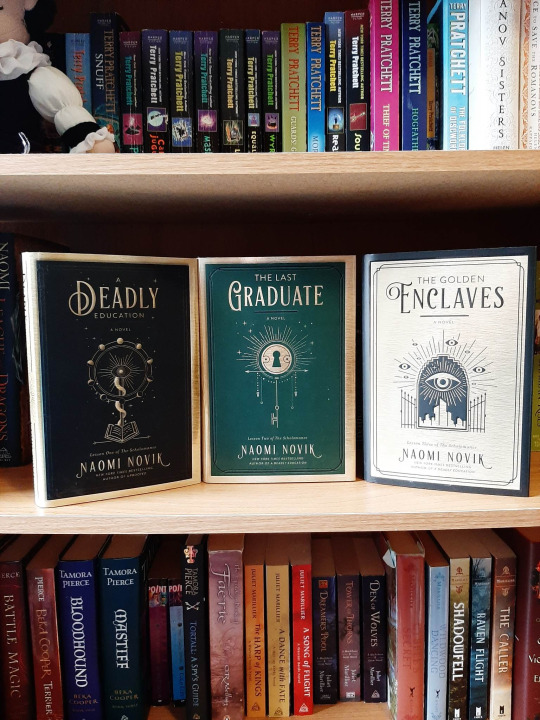
Did y'all know that the best thing in the world is friends who teach you new words? Because it's thanks to a friend close enough to be a brother that I have a word for what Naomi Novik's incredible Scholomance trilogy is. Time to meet hopepunk.
Hopepunk is brand-spanking new on the literature scene, and the term itself is attributable to author Alexandra Rowland, who coined the term in 2017. Collins English Dictionary picked it up in 2019, which is how you know it had enough traction to be legit.
So what is the definition of hopepunk? Rowland described it as "the opposite of grimdark" that is composed of "one atom of justice, one molecule of mercy, and the empire of unsheathed knives." Collins Dictionary is a little more precise in their definition: "A literary and artistic movement that celebrates the pursuit of positive aims in the face of adversity."
Novik's Scholomance trilogy begins with the world's deadliest boarding school and concludes with the truth of how a maw mouth is made, and all of those elements should objectively combine into a grimdark trilogy. And yet. El, her himbo hero, and kickass girlsquad refuse to go quietly into darkness and despair. They embody hope, resilience, and resistance to the toxic social order they have been raised I and are expected to perpetuate if they survive graduation--and that is the furthest thing from a guarantee.
El's journey from furiously pissed-off outcast and loner to Golden enclave crusader is never not compelling, and the insistent kindness for its own sake and radical hope that spits in the face of literal monsters in the literal walls means that hopelessness never touches this narrative. Sometimes things are *really bad* but it wouldn't be a story otherwise. The difference is that while George RR Martin is determined to beat the hope out of both his characters and his readers, Novik and El will beat it into you if they have to.
#naomi novik#the scholomance#books & libraries#fantasy#fiction#hopepunk#a deadly education#the last graduate#the golden enclaves#books and novels#books and reading#ya fantasy#ya books#book recommendations#boarding school fiction#boarding school books#strong female lead#strong female characters#strong female protagonist#orion is a complete himbo and nobody will ever convince me otherwise
334 notes
·
View notes
Text
Reminder that a strong female character can have any combination of hobbies and personality traits, yes, including that one, and still be very fucking feminist if:
She's given the same amount of agency as male characters in similar roles.
Her morally neutral, traditionally feminine traits are treated as morally neutral by the narrative.
Her character flaws aren't demonized noticeably more than male characters that did similar shit.
She's not sexualized at the expense of worldbuilding/characterization. (I could explain this more, but you know it when you see it.)
Not every woman in your story has the exact same personality and gender presentation as her.
She gets the same amount of tits/ass shots as equally sexy male characters in your story. (for visual mediums)
God, I hate strong female character talk, since the problem is rarely the character, it's the world around her.
43 notes
·
View notes
Text
Hey…pssst…do you think that Hollywood writers realize that trying to make female characters look empowered by belittling the surrounding male characters and making them look pathetic by comparison instead of making their female characters awesome by their own merit is the same tactic bullies use to feel better about themselves
#this is extremely targeted at she-hulk if you can’t tell#writing#strong female characters#mcu#anti mcu
438 notes
·
View notes
Text
Zdog
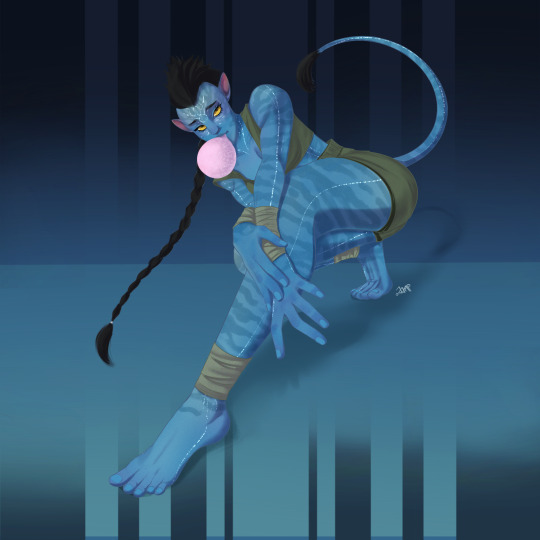
Here’s a piece of Zdog I did. I will post her with her tattoos soon! Happy Easter everyone 🐣🐰🥚✨🌈
#zdinarsk#z dog#avatar fanart#james cameron avatar#digital art#happy Easter#avatar recoms#avatar characters#strong female characters
144 notes
·
View notes
Text
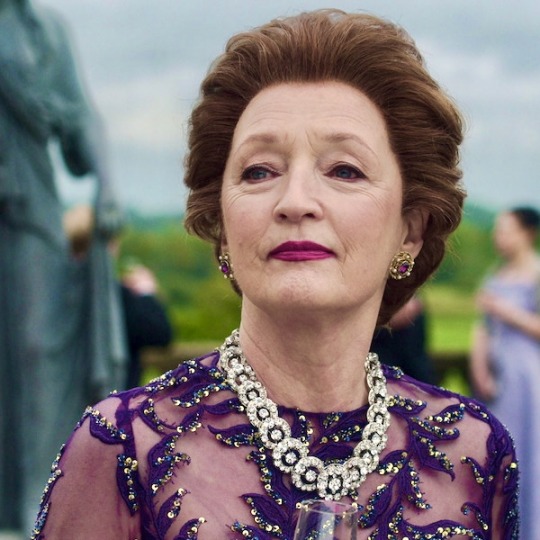
Lesley Manville as Princess Margaret in The Crown final season
#thecrownedit#lesley manville#cinemapix#the crown netflix#tvedit#dailyactresses#the crown#tv and film#strong female characters#the crown season 6#actress#princess margaret#lesleymanvilleedit#the crown final season#lmanvilleedit#diamonds#diamond necklace#crown jewel#teck circle necklace#teck diamond hoop necklace#royalty#windsor#1860s
50 notes
·
View notes